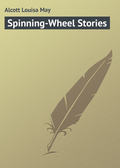
Луиза Мэй Олкотт
Three Unpublished Poems
Indelibly impressed upon Louisa Alcott's memory were those days at Fruitlands, when her childish feet ran swiftly over the pastures and through the pine grove, and where in the early mornings she sat upon a granite boulder far up on the hill and "thought thoughts" – so her diary tells us. She afterwards was frequently heard to say that it was in those days at Fruitlands that the seeds of her literary talents were sown, which were to meet with such heartfelt appreciation from the reading public, and were to give such solace and comfort to the old age of her gifted father and devoted mother. Her love and reverence for her father and her pride in his attainments were very beautiful: and in order to appreciate what it was in him that inspired this great sentiment, not only in his daughter, but in so many leading men of that time, the eccentricities of the man whom the world called unpractical and visionary must be forgotten, so as to get a glimpse of the Alcott who was the intimate friend of Emerson – a genius, a philosopher, an optimist, in spite of failure and in spite of opposition. Therefore it seems best to give some extracts from his own writings first that will reveal the tenor of his mind and the largeness of his heart and intellect, in order that the poems of the daughter may be more fully understood. The following extracts are from his book entitled "Tablets."
"If one's life is not worshipful," he writes, "no one cares for his professions… We recognize goodness wherever we find it. 'Tis the same helpful influence beautifying the meanest as the greatest service by its manners, as if it did it not."
"Enthusiasm is existence; earnestness, life's exceeding great reward…
"Our dispositions are the atmosphere we breathe, and we carry our climate and world in ourselves. Good humor, gay spirits, are the liberators, … the sure cure for spleen and melancholy … and he who smiles is never beyond redemption."
"The liberal mind is of no sect; it shows to sects their departure from the ideal standard, and thus maintains pure religion in the world. But there are those whose minds, like the pupil of the eye, contract as the light increases. 'Tis a poor egotism that sees only its own image reflected in its vision… 'Only as thou beest it, thou seest it!'"
"One cannot be well read unless well seasoned in thought and experience. Life makes the man. And he must have lived in all his gifts and become acclimated herein to profit by his readings. Living at the breadth of Shakespeare, the depth of Plato, the height of Christ gives the mastery, … or if not that, a worthy discipleship."
And here is a quotation that reveals his great and beautiful love of Nature:





